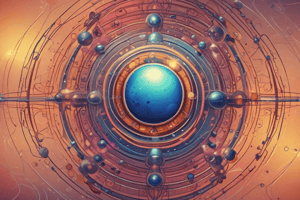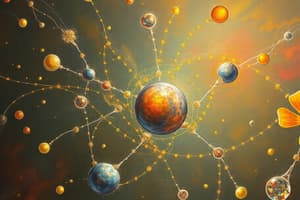Podcast
Questions and Answers
Which statement correctly describes the role of electrons in an atom?
Which statement correctly describes the role of electrons in an atom?
- Electrons have mass and reside in the nucleus.
- Electrons are negatively charged particles that orbit the nucleus. (correct)
- Electrons are positively charged particles that circle the nucleus.
- Electrons determine the mass of the atom.
What defines the type of a particular atom?
What defines the type of a particular atom?
- The charge of the neutrons.
- The number of protons found in the nucleus. (correct)
- The number of neutrons present in the atom.
- The mass of the electrons surrounding the nucleus.
Which of the following statements about neutrons is true?
Which of the following statements about neutrons is true?
- Neutrons are negatively charged particles.
- Neutrons help define an isotope of an atom. (correct)
- Neutrons positively charge the atom.
- Neutrons have mass but no charge. (correct)
What does Dalton’s Postulates state regarding chemical reactions?
What does Dalton’s Postulates state regarding chemical reactions?
What makes up most of the mass of the atom?
What makes up most of the mass of the atom?
What would happen to a compound if the number of atoms of each element changes?
What would happen to a compound if the number of atoms of each element changes?
Which charge do protons carry?
Which charge do protons carry?
If an atom gains an electron, what happens to its overall charge?
If an atom gains an electron, what happens to its overall charge?
What is the molar mass of magnesium nitrate, Mg(NO3)2?
What is the molar mass of magnesium nitrate, Mg(NO3)2?
How many grams of titanium are in 1.33 moles?
How many grams of titanium are in 1.33 moles?
What is the calculated number of sodium atoms in 10 g of sodium?
What is the calculated number of sodium atoms in 10 g of sodium?
What is the molar mass of oxygen gas O2?
What is the molar mass of oxygen gas O2?
How many grams are yielded from 2.55 × 10^23 atoms of lead?
How many grams are yielded from 2.55 × 10^23 atoms of lead?
What is the atomic mass of iron in grams per mole?
What is the atomic mass of iron in grams per mole?
Using Avogadro's number, how many O2 molecules are present in 0.470 g of oxygen gas?
Using Avogadro's number, how many O2 molecules are present in 0.470 g of oxygen gas?
What is the relationship between atomic mass and the number of grams in one mole of an element?
What is the relationship between atomic mass and the number of grams in one mole of an element?
How many neutrons are present in a carbon isotope with a mass number of 14?
How many neutrons are present in a carbon isotope with a mass number of 14?
What is Avogadro's Number?
What is Avogadro's Number?
If you have 0.5 mol of sodium (Na), how many sodium atoms do you have?
If you have 0.5 mol of sodium (Na), how many sodium atoms do you have?
How many moles are represented by 1.25 × 10^21 atoms of potassium (K)?
How many moles are represented by 1.25 × 10^21 atoms of potassium (K)?
What is the molar mass of iron (Fe)?
What is the molar mass of iron (Fe)?
Which of the following correctly describes the concept of a mole?
Which of the following correctly describes the concept of a mole?
How many electrons are typically found in a neutral atom of carbon?
How many electrons are typically found in a neutral atom of carbon?
What does the term 'molar mass' refer to?
What does the term 'molar mass' refer to?
How many grams of O3 are in 3.36 L of O3 at STP?
How many grams of O3 are in 3.36 L of O3 at STP?
What is the chemical formula for niacin, which contains 6 carbon atoms, 6 hydrogen atoms, 2 nitrogen atoms, and 1 oxygen atom?
What is the chemical formula for niacin, which contains 6 carbon atoms, 6 hydrogen atoms, 2 nitrogen atoms, and 1 oxygen atom?
What is the percent composition of oxygen in water (H2O)?
What is the percent composition of oxygen in water (H2O)?
If the mass of ammonium nitrate (NH4NO3) is 80 g/mol, what is the percent composition of nitrogen (N)?
If the mass of ammonium nitrate (NH4NO3) is 80 g/mol, what is the percent composition of nitrogen (N)?
What is the number of molecules of hydrogen gas (H2) present in 0.500 L at STP?
What is the number of molecules of hydrogen gas (H2) present in 0.500 L at STP?
What primarily indicates the number of each type of atom in a chemical formula?
What primarily indicates the number of each type of atom in a chemical formula?
For the compound TNT (C7H5(NO2)3), what would you need to calculate the percent composition of nitrogen?
For the compound TNT (C7H5(NO2)3), what would you need to calculate the percent composition of nitrogen?
Which of the following statements is true about a chemical formula?
Which of the following statements is true about a chemical formula?
What is the percent composition of carbon in TNT?
What is the percent composition of carbon in TNT?
Which formula represents the empirical formula of benzene?
Which formula represents the empirical formula of benzene?
How is the empirical formula for a compound determined from percent composition?
How is the empirical formula for a compound determined from percent composition?
What is the empirical formula for octane?
What is the empirical formula for octane?
If the empirical formula of a substance is CH, what can be said about its molecular formula?
If the empirical formula of a substance is CH, what can be said about its molecular formula?
What is the total mass of TNT calculated from its components?
What is the total mass of TNT calculated from its components?
What does the molecular formula indicate about a compound?
What does the molecular formula indicate about a compound?
What ratio of elements is represented in the empirical formula derived from 92.2 g of carbon and 7.83 g of hydrogen?
What ratio of elements is represented in the empirical formula derived from 92.2 g of carbon and 7.83 g of hydrogen?
Flashcards are hidden until you start studying
Study Notes
Electrons
- Small, negatively charged particles
- Orbit the nucleus
- Have no mass
- Number of electrons = number of protons
Protons
- Small, positively charged particles
- Located in the nucleus
- They, along with neutrons, make up most of the mass of the atom
- The number of protons defines the type of atom
- Number of protons = number of electrons
Neutrons
- Small, neutrally charged particles
- Located in the nucleus
- They, along with protons, make up most of the mass of the atom
- A differing number of neutrons defines an "isotope" of an atom
Properties of Subatomic Particles
| Particle | Mass (kg) | Mass (amu) | Charge |
|---|---|---|---|
| Electron | 9.10939 x 10^-31 | 0.00055 | 1- |
| Proton | 1.67262 x 10^-27 | 1.00728 | 1+ |
| Neutron | 1.67493 x 10^-27 | 1.00866 | 0 |
Atomic Theory of Matter
- The theory that atoms are the fundamental building blocks of matter reemerged in the early 19th century, championed by John Dalton.
Dalton's Postulates
- Each element is composed of extremely small particles called atoms.
- All atoms of a given element are identical to one another in mass and other properties, but the atoms of one element are different from the atoms of all other elements.
- Atoms are neither created nor destroyed in chemical reactions; they are merely rearranged.
- Compounds are formed when atoms of more than one element combine; a given compound always has the same relative number and kind of atoms.
Dalton's Atomic Theory (1808)
- Elements are composed of extremely small particles called atoms.
- All atoms of a given element.
- Compounds are composed of atoms of more than one element.
The Mole Concept
- The mole is a unit of measure for an amount of a chemical substance.
- Avogadro’s Number (symbol N) is the number of atoms in 12.01 grams of carbon.
- A mole is Avogadro’s number of particles, that is 6.02 × 1023 particles.
- We can use the mole relationship to convert between the number of particles and the mass of a substance.
The Mole
- One mole = amount of any substance that contains as many particles of that substance as there are atoms of C in 12 g of pure carbon-12
- 1 mole = 6.022× 1023 particles = Avogadro’s Number
- 1 mole of Fe = 6.022× 1023 atoms of Fe
- 1 mole of H2O = 6.022× 1023 molecules of H2O
Mole Calculations
- To convert from moles to atoms: Multiply by Avogadro's number (6.02 x 10^23)
- To convert from atoms to moles: Divide by Avogadro's number (6.02 x 10^23)
Molar Mass
- The atomic mass of any substance expressed in grams is the molar mass (MM) of that substance.
- The atomic mass of iron is 55.85 amu.
- The molar mass of iron is 55.85 g/mol.
Calculating Molar Mass
- The molar mass of a substance is the sum of the molar masses of each element.
Atomic Mass
- Atomic Mass (Atomic Weight) = number of grams in 1 mole of that element.
Mass-Mole Calculations
- To convert from moles to grams: Multiply by the molar mass.
- To convert from grams to moles: Divide by the molar mass.
Mole-Volume Calculations
- To convert from liters at STP (Standard Temperature and Pressure) to moles: Divide by 22.4 L/mol.
- To convert from moles to liters at STP: Multiply by 22.4 L/mol.
- To convert from liters at STP to molecules: Multiply by Avogadro's number and then by the number of molecules in one mole (6.02 x 10^23).
Chemical Formulas
- A molecule is composed of two or more nonmetal atoms.
- A chemical formula expresses the number and types of atoms in a molecule.
Writing Chemical Formulas
- The number of each type of atom in a molecule is indicated with a subscript in a chemical formula.
- If there is only one atom of a certain type, no ‘1’ is used.
Percent Composition
- The percent composition of a compound lists the mass percent of each element.
- For example, the percent composition of water, H2O is: 11% hydrogen and 89% oxygen
Calculating Percent Composition
- To find the percent composition of a compound, divide the mass of each element by the total mass of the compound and multiply by 100%.
Empirical Formulas
- The empirical formula represents the simplest whole number ratio of ions in a formula unit or atoms of each element in a molecule.
Empirical Formulas from Percent Composition
- Assume a 100 g sample and calculate the moles of each element.
- Divide the moles of each element by the smallest number of moles.
- The resulting numbers represent the subscripts in the empirical formula.
Molecular Formulas
- The actual molecular formula is some multiple of the empirical formula.
- To determine the molecular formula, find the empirical formula mass and divide the molecular mass by it.
- The resulting number represents the multiple of the empirical formula.
Studying That Suits You
Use AI to generate personalized quizzes and flashcards to suit your learning preferences.




